Key takeaways:
- Selective mutism is an anxiety disorder that affects communication, often rooted in fear and pressure to speak.
- Role-playing serves as an effective tool to build confidence and reduce anxiety by simulating real-life situations in a safe environment.
- The emotional support and connection fostered through role-playing activities can empower individuals to express themselves more freely.
- Creating a safe atmosphere and celebrating small progress are crucial in helping individuals overcome conversational challenges.

Understanding Selective Mutism
Selective mutism is more than just shyness; it’s a complex anxiety disorder that often surfaces in childhood. I remember a time when my niece, who was usually so lively at home, would go completely silent around her classmates. It left me wondering, could it be that her silence was a shield against the overwhelming pressure to speak?
This condition primarily affects children, but it can persist into adulthood if not addressed. For instance, I recall a friend whose selective mutism emerged during school presentations. Watching her struggle in such situations made me realize how isolating this experience can be. How can we support those who feel trapped in their silence, longing to be heard yet paralyzed by fear?
Understanding selective mutism requires a compassionate perspective. It’s crucial to recognize that those who are selectively mute often want to engage but feel an invisible barrier pulling them back. Reflecting on my own experiences, I can’t help but ask, how can we create spaces that encourage authentic expression without judgment?
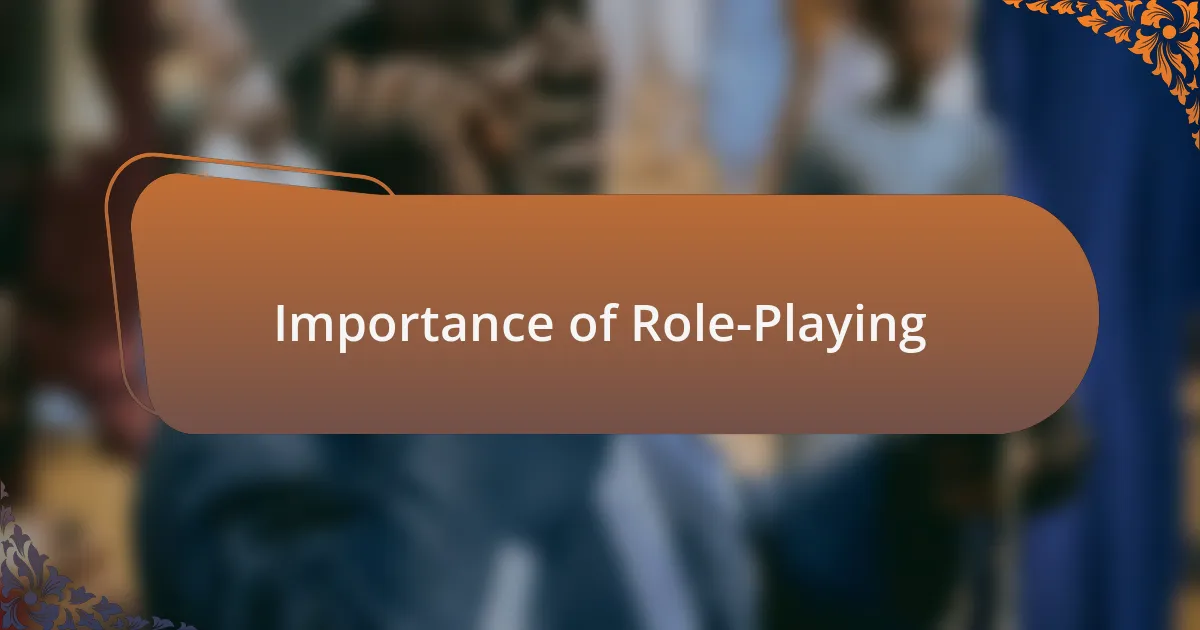
Importance of Role-Playing
Role-playing is a powerful tool, especially for individuals experiencing selective mutism. I still remember a workshop where we simulated everyday scenarios, like ordering at a café. It was eye-opening to see how practicing a simple interaction in a safe environment transformed the participants. The pressure vanished, allowing them to explore their voices in a supportive setting.
In my experience, role-playing fosters not just communication skills, but also confidence. I once participated in a group where we acted out common social situations, which helped me to understand the anxiety behind speaking up. It made me ponder: could a safe place where conversation feels rehearsed become a stepping stone for those struggling with anxiety?
Moreover, role-playing helps to bridge the gap between internal fears and external expression. I recall guiding a young boy through a series of dialogues where he gradually found his voice. Each attempt was a victory, and it became clear that with practice and empathy, we can create opportunities for real connections to flourish. How can we harness these experiences to encourage others on their journey to effective communication?
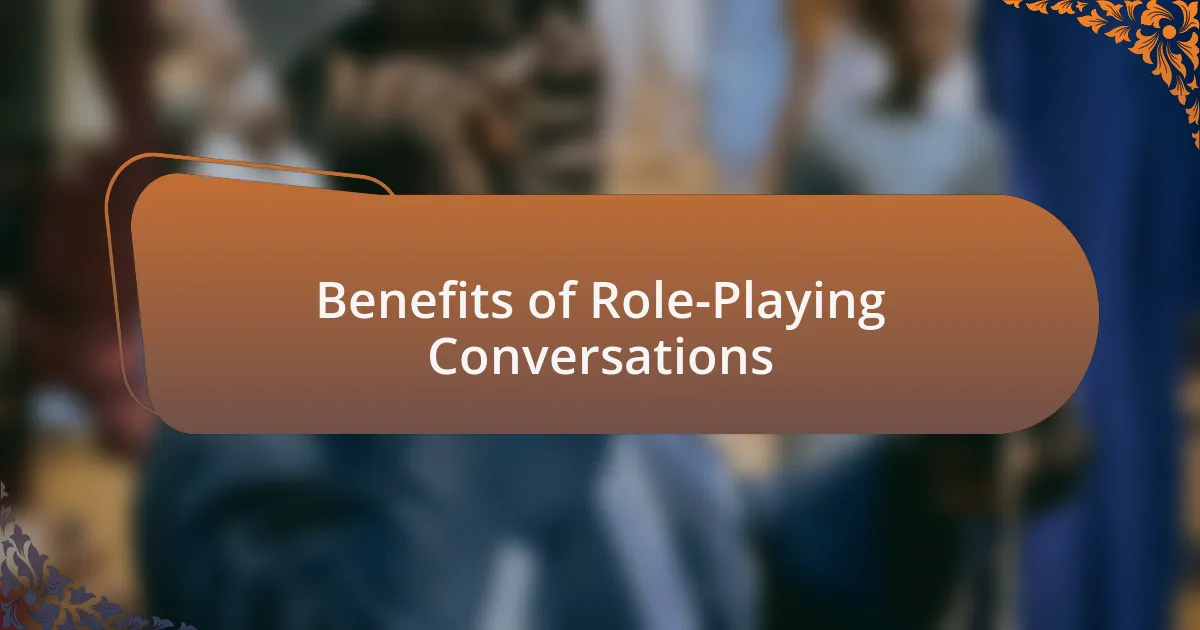
Benefits of Role-Playing Conversations
One of the primary benefits of role-playing conversations is that it allows individuals to encounter real-life situations in a controlled environment. I remember a time when I worked with a teenager who struggled to share his thoughts in class. By simulating these classroom interactions, he began to explore his feelings of nervousness without the fear of immediate judgment. This practice not only eased his anxiety but also equipped him with tools for actual discussions.
Engaging in role-playing also enhances emotional expression by providing a safe space to practice vulnerability. For me, the most impactful moments came when I witnessed participants openly articulating their fears during these exercises. Each rehearsal became a stepping stone, demonstrating that acknowledging our feelings is just as important as finding the words. This emotional release can catalyze change, making real-world conversations feel less daunting and more approachable.
Additionally, role-playing can cultivate empathy and understanding among peers. I recall facilitating a session where participants switched roles, allowing them to gain insights into each other’s challenges. This perspective shift often led to moments of connection, where individuals realized they were not alone in their struggles. How powerful is it to foster that kind of camaraderie, where everyone leaves a little more connected and understood?
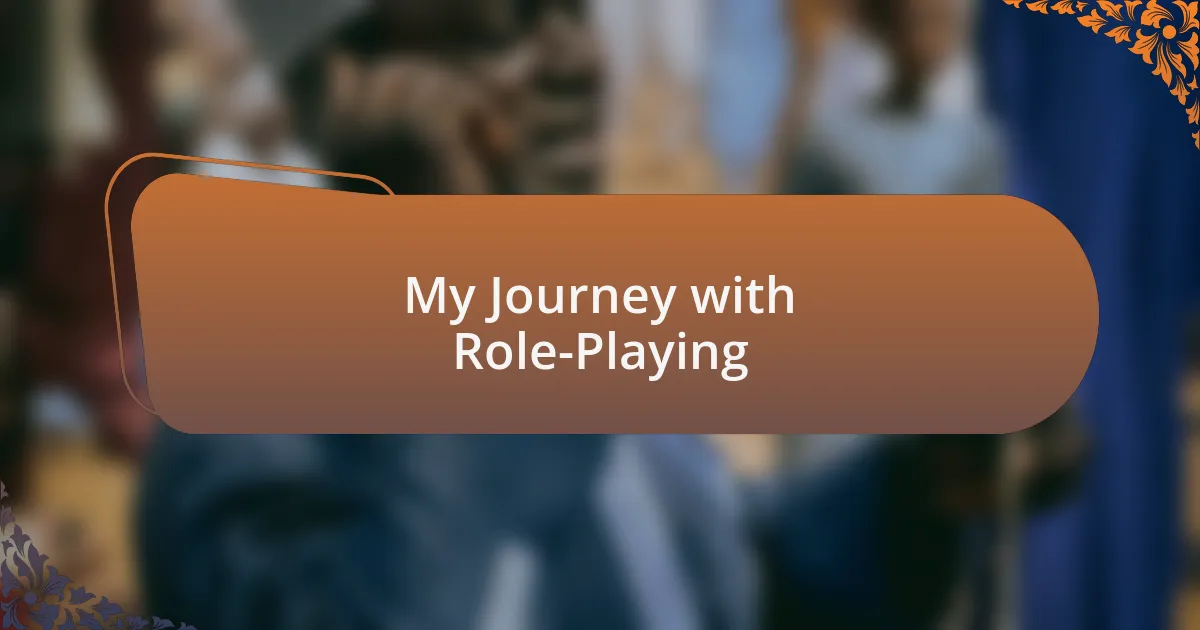
My Journey with Role-Playing
When I first started role-playing, I felt a mixture of excitement and apprehension. I remember one particular exercise where I took on the role of a teacher to help a child who struggled to speak to authority figures. Stepping into that character allowed me to understand not only the fear they faced but also the steps needed to create a more supportive environment for expressing thoughts. It struck me how vital these simulations were in boosting confidence, both for me and the participants.
As I delved deeper into role-playing, I realized it wasn’t just a tool for practicing speech—it became a path for self-discovery. One day, while guiding a group of children through a mock interview scenario, I noticed how their laughter transformed the atmosphere. This light-heartedness was profound; it allowed participants to approach their fears with a sense of playfulness. Could it be that facing fears in a safe, fun way makes them less intimidating?
Reflecting back, there were moments during role-playing that truly opened my eyes to the power of connection. I remember feeling a sense of pride when participants shared their experiences and fears with one another. The raw vulnerability that emerged felt like a unifying thread. Is it possible that through role-playing, we not only learn to communicate better but also to empathize more deeply? These are the moments that have reshaped my understanding of communication, proving that every role played can lead to profound insights and connections.
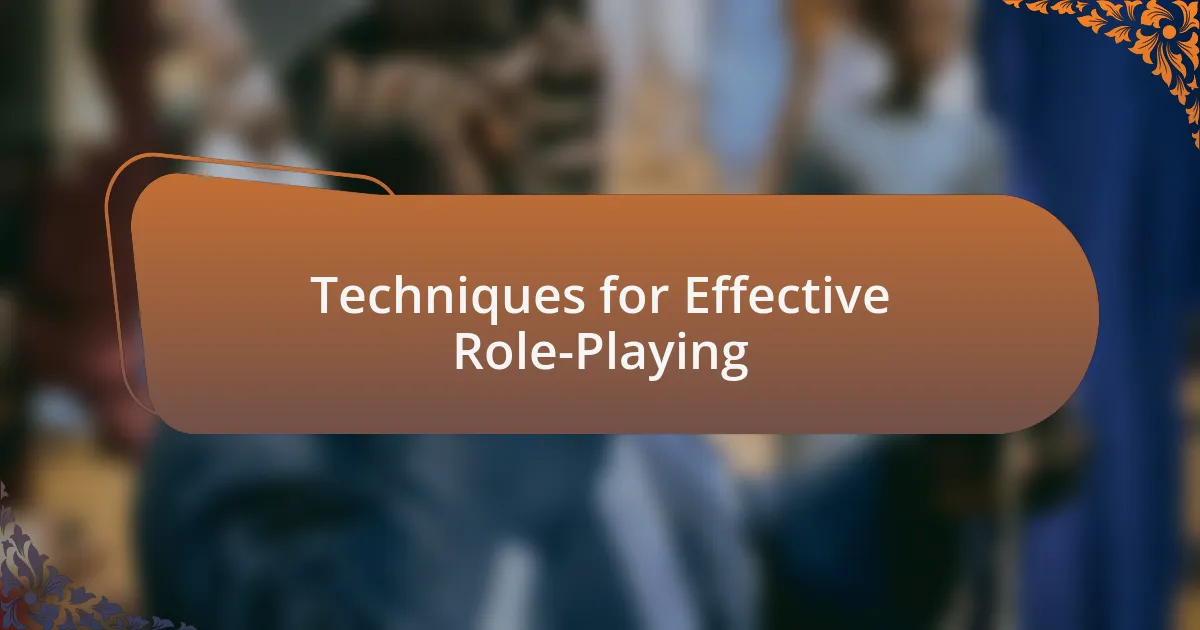
Techniques for Effective Role-Playing
To create an effective role-playing experience, it’s essential to set a comfortable atmosphere. I’ve found that beginning with icebreakers can ease tensions significantly. For instance, when starting a session, I sometimes ask participants to share a silly or funny experience. This simple act not only lightens the mood but also promotes openness, paving the way for more meaningful interactions.
Another technique that has proven valuable in my experience is the use of clear, relatable scenarios. When I crafted role-playing situations around everyday situations, like ordering food or asking for help, participants became more engaged. I remember a scenario where a child practiced asking for assistance in a store. Witnessing their initial hesitation transform into a confident request was incredibly rewarding. Did you know that choosing familiar scenarios directly influences the participant’s comfort level? It truly allows them to step out of their shells gradually.
Moreover, incorporating feedback loops during the role-playing sessions is crucial. After each exercise, I make it a point to ask participants what felt comfortable and what didn’t. I remember one instance where a child admitted feeling overwhelmed during a role-playing scenario, which opened the door to a valuable discussion about pacing and emotional readiness. Isn’t it interesting how dialogue about their feelings not only enhances their learning but also fosters a deeper connection among the group? Using this reflective approach can significantly enhance the effectiveness of role-playing.
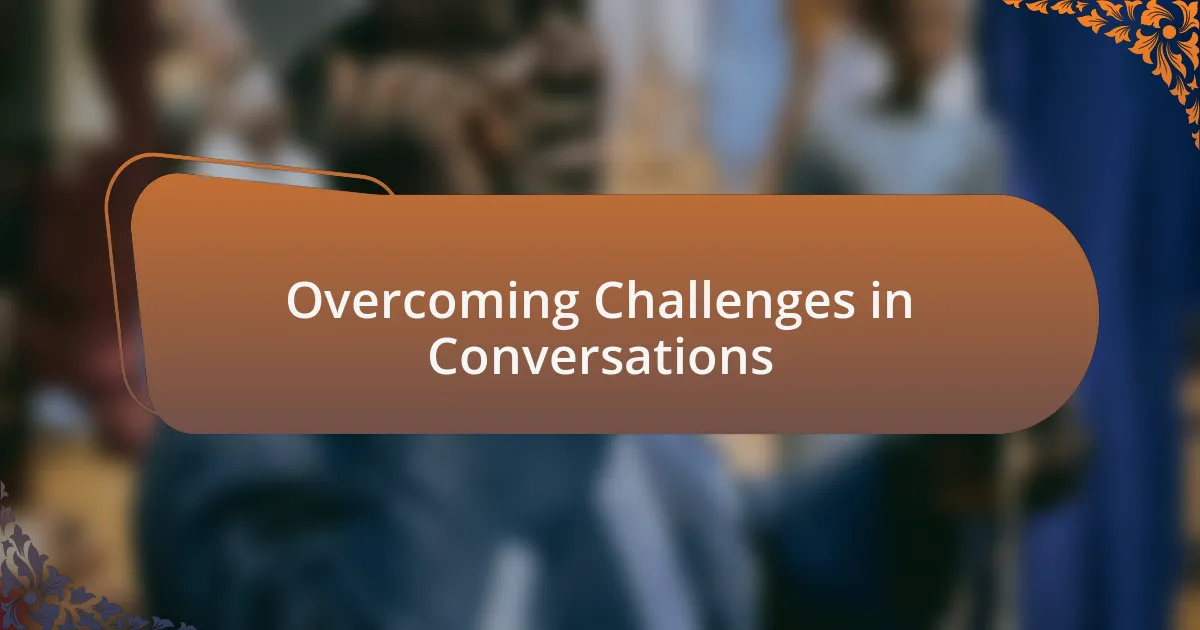
Overcoming Challenges in Conversations
Navigating conversations can often feel daunting, especially for those with selective mutism. I remember a particularly challenging session where a participant struggled to express themselves during a role-play. In that moment, I realized that silence can be powerful, too. By acknowledging their feelings and creating space for them to gather their thoughts, I witnessed a breakthrough. It reminded me that patience is key in overcoming conversational hurdles.
One effective strategy I’ve seen is the use of gradual exposure to challenging situations. For example, I once facilitated a group where participants started by practicing one-word responses in a low-stakes environment. As they built confidence, we gradually introduced more complex exchanges. It was inspiring to see how even the smallest victories encouraged them to push through their fears. Can you imagine how empowering it must feel to go from a timid whisper to participating in a lively discussion?
Emotional support plays an essential role in overcoming conversational challenges. I recall another instance when I paired participants for practice dialogues where they could empathize with each other’s experiences. This shared vulnerability cultivated an atmosphere of trust and camaraderie. Witnessing participants uplift one another during these moments was deeply moving. It left me questioning: how often do we overlook the power of connection in fostering communication?

Insights from My Experiences
One insight I gained from my experiences in role-playing conversations is the importance of establishing a safe environment. I once led a session where a participant was visibly anxious about speaking. By simply encouraging them to share their thoughts without the fear of judgment, I saw them open up in ways I never anticipated. It made me wonder, how often do we create spaces where individuals feel truly heard and valued?
Another valuable lesson emerged when I introduced improvisational elements into our discussions. I remember a particular moment when a participant, who typically struggled with spontaneous speech, surprised us all with a creative response. This spontaneity sparked a chain reaction, lifting everyone’s spirits. Have you ever experienced that electrifying moment when one person’s courage ignites a collective confidence?
Lastly, I’ve recognized that celebrating progress, no matter how small, is vital. During one session, we took a moment to reflect on how far participants had come, and the emotional uplift in the room was palpable. I asked them to share their feelings about their journey, and I was overwhelmed by the gratitude and encouragement that flowed. It reminded me that each step forward, regardless of its size, is worth acknowledging and celebrating together.